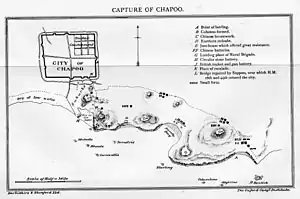Zhapu
Zhapu, alternately romanized as Chapoo or Chapu,[2] is a town under the administration of Pinghu, in the north of Zhejiang Province, China.[3] It is located along the northern shore of Hangzhou Bay in the southeastern part of Pinghu and borders Haiyan County to its south and southeast. The town covers an area of 54.4 square kilometers and has a population of 54,000.
Xiapu
乍浦镇 Chapoo | |
|---|---|
 Xiapu Location in Zhejiang | |
| Coordinates (Zhapu government): 30°36′15″N 121°05′43″E | |
| Country | People's Republic of China |
| Province | Zhejiang |
| Prefecture-level city | Jiaxing |
| County-level city | Pinghu |
| Time zone | UTC+8 (China Standard) |
| Zhapu | |||||||||
|---|---|---|---|---|---|---|---|---|---|
 A map of the Battle of Zhapu, showing the city's walls and harbor in the mid-19th century | |||||||||
| Chinese | 乍浦[1] | ||||||||
| Postal | Chapoo | ||||||||
| Literal meaning | Sudden Bank | ||||||||
| |||||||||
History
Zhapu is the site of a deepwater harbor on the northern shore of Hangzhou Bay, noted as a port since the Tang.[4] Under the Qing, an extensive canal network connected it to Hangzhou and turned it into the area's principal port.[2] Under the dynasty's restrictive trade policies, its merchants monopolized China's trade with Korea and Japan.[5]
At the time of the First Opium War, Chapu was protected by an imperial army garrison[6] and a city wall with a circuit of about 5 miles (8.0 km).[2] The British captured the town on 18 May 1842 but abandoned it shortly thereafter.[2] By that time, the harbor had begun silting up and was only accessible to the lighter-draft British vessels.[7] It was omitted it from the treaty ports at the end of the war and declined in importance relative to nearby Shanghai and Ningbo.
By the early 20th century, its harbor had effectively silted up and the town became a backwater.[7]
Zhapu Port

Zhapu port, located south of the mouth of Yangtze river is a new port developed after 2000, and is a part of the port of Jiaxing. It is located in Hangzhou bay, equidistant from Ningbo, Hangzhou and Huzhou.[8]
Notes
- 乍浦镇自然概况. Retrieved 24 July 2016.
- EB (1878).
- "PingHu-China Archived October 9, 2010, at the Wayback Machine". pinghu.gov.cn. Accessed 26 October 2010.
- Crossley, Pamela Kyle (1991). Orphan Warriors: Three Manchu Generations and the End of the Qing World. Princeton University Press. p. 69. ISBN 0-691-00877-9.
- Crossley, Pamela Kyle (1991). Orphan Warriors: Three Manchu Generations and the End of the Qing World. Princeton University Press. p. 69. ISBN 0-691-00877-9.
- Cassel, Pär (2003), "Excavating Extraterritoriality: The "Judicial Sub-Prefect" as a Prototype for the Mixed Court in Shanghai", Late Imperial China, 24, pp. 156–182.
- EB (1911).
- "Zhapu port". www.mingtaiwl.net. Zhejiang Mingtai logistics. Retrieved 26 December 2018.
References
- Baynes, T. S., ed. (1878), , Encyclopædia Britannica, 5 (9th ed.), New York: Charles Scribner's Sons, p. 398
- Chisholm, Hugh, ed. (1911), , Encyclopædia Britannica, 5 (11th ed.), Cambridge University Press, p. 855